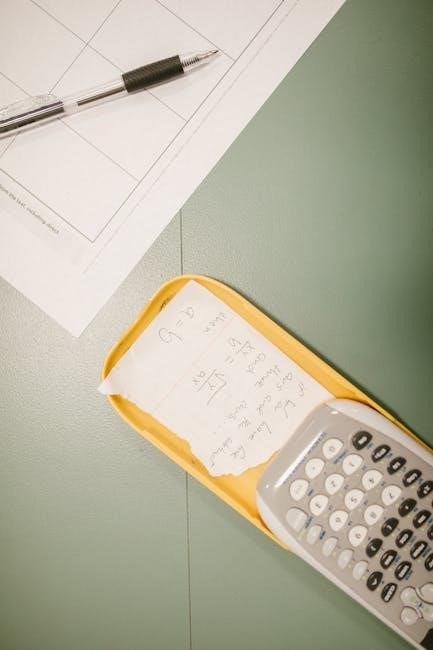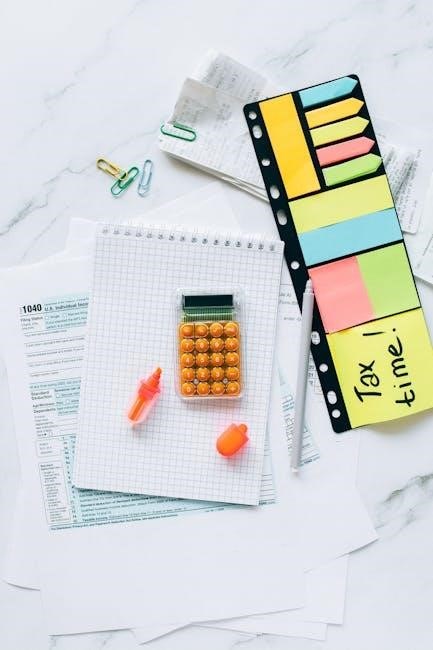Year 7 Maths test papers are essential study resources designed to help students prepare for exams. They provide practice opportunities, covering a range of topics and skills, ensuring readiness.
What Are Year 7 Maths Test Papers?
Year 7 Maths test papers are structured resources designed to assess students’ understanding of key mathematical concepts. They typically include a variety of questions, such as multiple-choice and open-response tasks, covering topics like number operations, algebra, and data handling. These papers are often aligned with the curriculum and include mark schemes to help students and teachers evaluate performance. They are widely used for revision, practice, and exam preparation, providing students with a clear understanding of exam formats and expectations. Test papers may also include instructions and timing guidelines to simulate real exam conditions, ensuring students are well-prepared for their assessments.
Why Are Year 7 Maths Test Papers Important?
Year 7 Maths test papers are vital for assessing student progress and exam readiness. They provide a structured way to practice and reinforce mathematical skills, helping students identify strengths and weaknesses. Regular use of these papers improves problem-solving abilities, time management, and familiarity with exam formats. They also enhance confidence by allowing students to apply knowledge in a simulated test environment. Additionally, test papers with mark schemes enable students and teachers to evaluate performance accurately, ensuring targeted revision. Overall, they are an essential tool for achieving academic success and building foundational maths skills effectively.

Benefits of Using Year 7 Maths Test Papers
Year 7 Maths test papers help students identify strengths and weaknesses, build confidence, and improve problem-solving skills through structured practice and exam-style questions.
Improved Understanding of Exam Format
Year 7 Maths test papers provide students with a clear understanding of the exam format, including question types, time management, and instructions. Regular practice with these papers familiarizes students with the layout, reducing anxiety during actual exams. They cover multiple-choice, short-answer, and open-response questions, mirroring real test structures. Mark schemes and instructions are often included, helping students grasp grading criteria and expectations. This exposure ensures students know what to expect, allowing them to focus on problem-solving rather than navigating an unfamiliar format. Over time, this builds confidence and reduces exam-day stress, making the test-taking experience smoother and more manageable.
Enhanced Time Management Skills
Year 7 Maths test papers play a crucial role in enhancing time management skills, a vital aspect of exam success. By practicing with these papers, students learn to allocate specific time slots to different question types, ensuring they complete the test within the allotted period. The structured format of the papers helps students prioritize questions, avoid spending too long on challenging problems, and maintain a steady pace. Regular practice fosters a sense of urgency, enabling students to manage their time more effectively during actual exams. This skill not only boosts performance but also reduces exam-day anxiety, allowing students to approach tests with greater confidence and focus.
Identification of Weak Areas
Year 7 Maths test papers are invaluable for identifying weak areas in a student’s understanding. By attempting questions across various topics, students can pinpoint where they struggle most. The papers cover a wide range of concepts, from number operations to algebra and geometry, allowing for a comprehensive assessment of strengths and weaknesses. Reviewing mark schemes after completing a test highlights incorrect answers and provides explanations, enabling students to address gaps in their knowledge. Regular practice with these papers helps students focus their revision efforts on areas needing improvement, ultimately leading to better overall performance and confidence in their mathematical abilities.
Boosting Confidence Levels
Year 7 Maths test papers play a significant role in boosting students’ confidence levels. Regular practice with these papers helps students become familiar with the exam format and question types, reducing anxiety. Completing tests under timed conditions allows students to assess their performance and track progress over time. Seeing improvements in scores and understanding encourages a sense of accomplishment. Additionally, the inclusion of mark schemes enables students to review mistakes, understand where they went wrong, and learn from them. This process builds resilience and confidence, preparing students to approach actual exams with greater self-assurance and a positive mindset.

Key Features of Year 7 Maths Test Papers
Year 7 Maths test papers offer comprehensive topic coverage, combining multiple-choice and open-response questions. They align with curriculum standards and include detailed mark schemes for accurate self-assessment.
Comprehensive Coverage of Maths Topics
Year 7 Maths test papers provide a thorough review of key mathematical concepts, ensuring students are well-prepared for exams. Topics include algebra, geometry, statistics, and number operations. The papers cover a wide range of skills, from basic calculations to complex problem-solving. Each test is designed to assess understanding and application of maths principles. By practicing with these papers, students can identify strengths and areas needing improvement. The comprehensive approach ensures no topic is overlooked, aligning closely with curriculum requirements. This holistic coverage helps build confidence and a solid foundation for future studies.
Multiple-Choice and Open-Response Questions
Year 7 Maths test papers feature a mix of multiple-choice and open-response questions, catering to different learning styles and assessment methods. Multiple-choice questions allow students to quickly identify correct answers, while open-response questions require detailed problem-solving and mathematical reasoning; This variety ensures a balanced evaluation of knowledge and application skills. The inclusion of both question types helps students develop accuracy and critical thinking. Additionally, the papers often include mark schemes, providing clear guidelines for scoring and feedback. This structured approach ensures students can practice and improve effectively, aligning with curriculum standards and expectations.
Aligned with Curriculum Requirements
Year 7 Maths test papers are carefully designed to align with curriculum requirements, ensuring relevance and effectiveness for students. These papers cover key topics such as number operations, algebra, geometry, and data handling, reflecting the skills and knowledge outlined in educational standards. By mirroring the curriculum, they provide targeted practice, helping students reinforce classroom learning. The alignment ensures that the questions and content are appropriate for the age group and skill level, making the test papers a valuable resource for both teachers and students. This consistency aids in preparing learners for formal assessments and builds a strong foundation for future studies.
Inclusion of Mark Schemes
Year 7 Maths test papers often include detailed mark schemes, providing clear guidelines for evaluating student performance. These schemes outline the correct answers, grading criteria, and allocation of marks for each question. They enable students to understand how their work will be assessed, fostering transparency and fairness. Mark schemes also serve as a valuable tool for self-assessment and revision, allowing learners to identify areas where they may need additional practice. Teachers benefit from these resources as well, as they facilitate consistent and accurate grading. The inclusion of mark schemes enhances the educational value of the test papers, making them a comprehensive study aid for both students and educators.

Where to Find Year 7 Maths Test Papers
KS3 Maths Practice Papers
KS3 Maths Practice Papers are exclusive resources for students in Years 7-9, offering never-before-seen mock exams. They include mark schemes and are available for purchase in sets of 3, 9, or 15 papers, providing comprehensive practice for maths revision and exam preparation. These papers are designed to align with curriculum requirements, ensuring students gain familiarity with exam formats and question types. They are an excellent tool for both students and educators aiming to enhance maths skills and confidence.
Official Educational Websites
Official educational websites offer a wealth of Year 7 Maths test papers in PDF format. Platforms like twinkl.com provide specimen papers, mark schemes, and practice materials designed to align with curriculum requirements. These resources are ideal for students preparing for exams, as they cover a range of maths topics and question types. Many official sites allow free downloads, while others may require purchase. They often include answers and detailed marking guidelines, making them valuable tools for revision and self-assessment. These papers help students familiarize themselves with exam formats and improve their problem-solving skills. They are widely regarded as reliable sources for effective exam preparation.
Online Learning Platforms
Online learning platforms like MME offer exclusive Year 7 Maths test papers and practice materials. These platforms provide never-before-seen KS3 mock papers, suitable for students in Years 7-9, along with mark schemes. They are designed to help students revise effectively and gain confidence in their maths skills. Many platforms allow users to purchase bundles of papers, making them a cost-effective option for comprehensive revision. These resources are often tailored to curriculum requirements and include a mix of question types, ensuring a well-rounded preparation for exams. They are easily accessible and provide students with the tools needed to succeed in their maths assessments;
KS3 Maths practice papers are tailored for students in Years 7-9, offering a structured approach to exam preparation. These papers are designed to cover a wide range of maths topics, ensuring a comprehensive understanding of the curriculum; Many resources include mark schemes, allowing students to review their answers and identify areas for improvement. Practice papers often feature both multiple-choice and open-response questions, simulating real exam conditions. They are particularly useful for students aiming to build confidence and familiarity with the exam format. Regular use of these papers helps students track their progress and develop problem-solving skills effectively.
School Resources and Libraries
Schools and libraries are valuable sources for Year 7 Maths test papers. Many educational institutions provide past papers, study guides, and practice materials specifically designed for KS3 students. Libraries often stock maths workbooks, revision guides, and test papers that align with curriculum requirements. Additionally, schools may distribute resources like mark schemes and worksheets to help students prepare effectively. These resources are easily accessible and serve as excellent supplements to online materials. Students can utilize these to familiarize themselves with exam formats, improve problem-solving skills, and build confidence in their mathematical abilities.

How to Use Year 7 Maths Test Papers Effectively
Regular practice, simulating exam conditions, reviewing mark schemes, and tracking progress are effective ways to use Year 7 Maths test papers for better preparation and improved results.
Regular Practice Routine
A consistent practice routine is crucial for mastering Year 7 Maths. Set aside dedicated time each day or week to work through test papers. Start with shorter sessions, gradually increasing duration as exams approach. Focus on understanding each question, ensuring no topic is overlooked. Regular practice helps build familiarity with the exam format, identifies weak areas, and enhances problem-solving skills. By maintaining a steady routine, students can systematically improve their maths abilities, leading to greater confidence and better performance in actual tests;
Simulating Exam Conditions
Simulating exam conditions while using Year 7 Maths test papers helps students adapt to the actual test environment. Set a timer according to the exam duration, typically 45-60 minutes, to practice time management. Use only permitted materials, such as pens, pencils, and rulers, and avoid calculators unless specified. Work through the paper without interruptions, just like in a real exam. After completing, review the mark scheme to assess performance. This process reduces exam anxiety, builds familiarity with instructions, and improves time allocation skills, ensuring students are well-prepared for the actual test.
Reviewing Mark Schemes
Reviewing mark schemes is a crucial step after completing Year 7 Maths test papers. These documents provide detailed explanations for each question, including correct answers and mark allocations. By comparing your work with the mark scheme, you can identify mistakes, understand where marks were lost, and learn from errors. This process helps clarify concepts, improves problem-solving techniques, and builds a deeper understanding of exam questions. Regularly reviewing mark schemes also highlights areas for improvement, ensuring students are well-prepared for future assessments. It fosters a habit of self-assessment, which is vital for academic success.
Tracking Progress Over Time
Tracking progress over time is essential when using Year 7 Maths test papers. Regularly reviewing results helps identify improvements and areas needing attention. By comparing scores from different tests, students can monitor their growth and stay motivated. This consistent evaluation allows for targeted practice, ensuring weak areas are addressed effectively. Over time, this methodical approach builds confidence and reinforces understanding of key concepts. It also provides a clear roadmap for improvement, helping students set achievable goals and celebrate their academic development.

Common Mistakes to Avoid When Using Test Papers
Common mistakes include neglecting time management, not reviewing mistakes, skipping difficult questions, and ignoring mark schemes, all of which hinder effective preparation and understanding.
Neglecting Time Management
Neglecting time management is a common mistake when using Year 7 Maths test papers. Students often rush through questions or spend too long on difficult ones, leading to incomplete answers. This can result in lower scores and increased stress during actual exams. To avoid this, practice tests should be completed under timed conditions to simulate exam settings. Encourage students to allocate time evenly across all questions, prioritizing easier ones first. Reviewing mark schemes can also help identify time-saving strategies and improve overall performance. Proper time management is crucial for achieving the best results.

Not Reviewing Mistakes
Not reviewing mistakes is a significant oversight when using Year 7 Maths test papers. Many students complete practice tests but fail to analyze their errors. This prevents them from understanding where they went wrong and how to improve. Mark schemes, often included with test papers, provide detailed explanations for correct answers, helping students identify gaps in their knowledge. By neglecting to review mistakes, students risk repeating errors in future assessments. Regularly going over incorrect answers and understanding the reasoning behind them is essential for long-term progress and achieving better results in exams. This step is vital for effective learning and growth.
Skipping Difficult Questions
Skipping difficult questions during practice with Year 7 Maths test papers is a common mistake that limits learning. Students often avoid challenging problems to save time or avoid frustration, but this prevents them from identifying and addressing weak areas. Difficult questions are designed to test understanding and application of key concepts. By skipping them, students miss valuable opportunities to improve their skills and confidence. Instead, they should attempt all questions, using mark schemes to understand mistakes and practice effectively. This approach ensures steady progress and better exam performance. Regularly tackling tough questions builds resilience and a deeper grasp of mathematical principles.
Ignoring Mark Schemes
Overlooking mark schemes while using Year 7 Maths test papers is a critical mistake that hinders learning. Mark schemes provide detailed explanations for each answer, helping students understand their errors and improve. By ignoring them, students miss out on valuable insights into correct methods and common mistakes; This lack of review limits their ability to identify weak areas and reinforce understanding. Regularly reviewing mark schemes ensures students can learn from their mistakes, develop better solution strategies, and achieve better results in future assessments. It is essential to use mark schemes to maximize the benefits of practice papers.

Year 7 Maths Test Paper Format
Year 7 Maths test papers typically include multiple-choice and open-response questions, covering various topics. They often feature mark schemes, clear instructions, and specific time allowances for completion.
Structure of the Test Paper
The Year 7 Maths test paper is divided into clear sections, often starting with multiple-choice questions and progressing to open-response tasks. Each section targets specific skills, such as arithmetic, algebra, and problem-solving. The paper typically includes a mix of short and extended questions, allowing students to demonstrate their understanding at different levels. Time limits are specified, with instructions on permitted tools like pens, pencils, and rulers. Students are encouraged to show all working on the test paper, and reference sheets may be provided for certain topics. Understanding this structure helps students navigate the test effectively and manage their time wisely during exams.

Types of Questions Included
Year 7 Maths test papers feature a variety of question types to assess different skills. Multiple-choice questions test recall and recognition, while open-response questions require detailed problem-solving and explanations. Short-answer questions focus on specific concepts, such as arithmetic or algebra, and longer, more complex problems evaluate critical thinking and application of knowledge. Word problems and real-world scenarios are also included to develop practical maths skills. Additionally, mixed-topic sections ensure a comprehensive understanding of the curriculum, challenging students to apply their learning across different areas of mathematics.
Mark Allocation and Scoring
Year 7 Maths test papers include detailed mark allocation to guide students and teachers. Each question is assigned marks based on difficulty and complexity, ensuring fairness in assessment. Mark schemes provided alongside papers outline exact criteria for scoring, allowing students to understand how to earn full or partial marks. Total marks vary per paper but often range between 50 to 100, reflecting the content’s depth. Clear instructions on scoring help students and educators assess performance accurately, while promoting transparency in grading. This system ensures consistent evaluation and helps identify areas for improvement.
Instructions for Candidates
Year 7 Maths test papers provide clear instructions to ensure students understand exam expectations. Candidates are advised to use black or blue ink for answers and pencils for diagrams. Calculators are not permitted, and all working must be shown on the test paper. Students should attempt all questions, as there are no negative marks for incorrect answers. Rough paper is not allowed; all calculations must be done directly on the test paper. The test duration varies, typically ranging from 45 minutes to 1 hour. Candidates are encouraged to manage their time effectively to complete all sections. Adhering to these instructions ensures a fair and structured assessment process.

Additional Resources to Supplement Test Papers
Supplement your learning with study guides, online tutoring, and interactive maths games. Classroom worksheets and revision materials also provide extra practice, reinforcing concepts and exam techniques effectively.
Study Guides and Revision Materials
Study guides and revision materials are invaluable for reinforcing maths concepts. Textbooks, worksheets, and online resources provide structured lessons and exercises, covering topics like number operations, algebra, and geometry. Many guides include practice questions, examples, and step-by-step solutions, helping students understand and apply mathematical principles. Revision materials often align with curriculum requirements, ensuring focused preparation for Year 7 maths tests. Additionally, resources like Sparx Clips and interactive tools offer visual and engaging ways to grasp complex ideas. These materials complement test papers by offering in-depth practice and clarity, making them essential for thorough exam preparation and skill development.
Online Tutoring and Video Lessons
Online tutoring and video lessons provide interactive and engaging ways to learn maths. Platforms offer live sessions with tutors who explain concepts in detail, while video lessons cover topics through visual demonstrations. These resources are particularly helpful for clarifying difficult questions and understanding new ideas. Many videos are aligned with curriculum topics, making them ideal for supplementing test paper practice. Students can access these materials anytime, allowing for flexible learning. Additionally, interactive content often includes quizzes and exercises, reinforcing understanding and improving problem-solving skills. These tools are invaluable for students seeking extra support or deeper insight into maths concepts, enhancing their overall preparation and confidence.
Interactive Maths Games
Interactive maths games are a fun and engaging way to enhance learning. They cover various topics such as algebra, geometry, and data handling, making complex concepts more accessible. These games cater to different learning styles, offering an interactive approach that fosters problem-solving skills. Many platforms provide maths games specifically designed for Year 7 students, aligning with curriculum topics. They allow students to practice maths in a relaxed and enjoyable manner, reducing anxiety and building confidence. While games are supplementary tools, they complement traditional study methods like test papers, offering a dynamic way to reinforce maths understanding and retention. Regular use of these games can significantly improve maths fluency and accuracy, making them a valuable resource for students preparing for exams or seeking additional practice.
Classroom Worksheets
Classroom worksheets are valuable resources that provide structured maths practice for Year 7 students. They cover topics like number operations, algebra, and geometry, offering targeted exercises to reinforce learning. Many worksheets include problem-solving activities, word problems, and puzzles to engage students. Teachers often use them to supplement lessons, ensuring students grasp key concepts. Worksheets are usually accompanied by answers or mark schemes, allowing students to self-assess and understand their mistakes. They are widely available on educational websites, in school libraries, or as part of maths curriculum materials. Regular use of worksheets helps students build confidence and improve their problem-solving skills, making them an excellent addition to maths test paper preparation.
Year 7 Maths test papers are invaluable tools for exam preparation, skill improvement, and confidence building. Regular practice ensures students are well-equipped for academic success.
Final Thoughts on Using Year 7 Maths Test Papers
Year 7 Maths test papers are invaluable for students aiming to excel in their studies. They provide a structured way to practice and reinforce key mathematical concepts. Regular use of these papers helps students familiarize themselves with exam formats, improving time management and problem-solving skills. Additionally, they enable students to identify and address weaker areas, boosting confidence and readiness for assessments. By incorporating these resources into study routines, students can achieve a deeper understanding of Maths and develop a strong foundation for future academic success.
Encouragement for Students
Embrace Year 7 Maths test papers as a powerful tool to enhance your learning journey. Regular practice with these resources will build confidence and familiarity with exam formats. Celebrate small achievements and don’t hesitate to seek help when needed. Remember, consistent effort leads to improvement. Stay motivated, as these papers are designed to help you succeed. Believe in your abilities and keep pushing forward—you’ve got this!